Startups developing an AI-assisted CRISPR protein engineering platform, nextgen gastroenterology, airbone environmental DNA analysis, a digital doctor for wind turbines, and a modern AR tool for industrial safety each get CHF 10,000
23.01.2024
CRISPR Protein Engineering, DigeHealth, DNAir, RTDT Laboratories, and ucentrics were selected at Venture Kick's first financial and entrepreneurial support stage. Their projects develop a new set of CRISPR tools that unlock the full potential of CRISPR therapies.; a 24h/7 monitoring system that provides relief for patients suffering from bowel obstruction; pioneer airborne environmental DNA analysis providing a scalable approach for extensive biodiversity assessment; tackle the problem of recurring structural failures of wind turbines by developing a novel hardware-software solution for structural health monitoring of wind turbines; and empower organizations by revolutionizing industrial user guidance & knowledge Management.
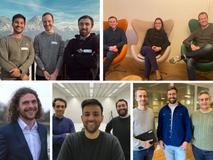 |
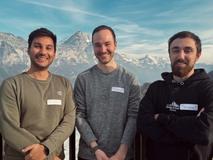 CRISPR Protein Engineering: from left to right, Kim Marquart, Lukas Schmidheini, and Sasha Melkonyan
|
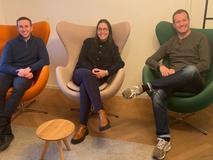 DigeHealth: from left to right, Biomedical Systems Engineer Lyle Halliday, CEO and co-founder Nour Ghalia Abassi, and co-founder, advisor, and board member Marcel Wuethrich
|
 DNAir: CEO Fabian Roger
|
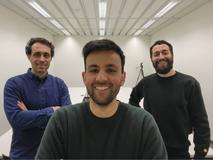 RTDT: from left to right, CEO Dr. Imad Abdallah, CCO Aris Mukherjee, and CSO Dr. Konstantinos Tatsis
|
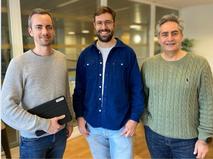 ucentrics: co-CEO-CPO Julian Wolf, CTO Sophokles Ktistakis, and co-CEO Amir Golshani
|
CRISPR Protein Engineering: Unlocking the full potential of CRISPR therapies
Today, 1 in 10 people worldwide suffer from a genetic disease, caused by a mutation in their DNA. Only 10% of these diseases have a treatment option available and even then, these treatments are directed at managing the disease instead of curing the underlying genetic cause. Clustered Regularly Interspaced Short Palindromic Repeats (CRISPR) is poised to change that. It can be programmed to find a specific location in DNA and make an edit there, reverting the disease-causing mutation to its healthy state again. However, current CRISPR tools have major limitations around their targeting range, efficiency, and specificity.
During their research, Sasha Melkonyan, Lukas Schmidheini, and Kim Marquart have built a high-throughput, AI-assisted protein engineering platform using a combination of directed evolution, lab automation, and machine learning to screen billions of proteins per day for a specific function. They are now using this platform to develop a new set of CRISPR tools that unlock the full potential of CRISPR therapies.
Venture Kick Stage I funds will help them to develop the business case for their product, find potential clients, and design their IP portfolio.
DigeHealth: revolutionizing gastroenterology
Globally, inflammatory bowel disease (IBD) affects 10 million individuals, with bowel obstruction posing a particularly grave threat to those with Crohn's disease. Recurrent obstructions afflict more than half of these patients, leading to dire consequences if not promptly addressed such as surgeries perforations, and even death.
DigeHealth is a medtech company that has the goal to revolutionize gastroenterology. Their solution is a 24h/7 monitoring system that provides relief for patients suffering from bowel obstruction. It is designed to detect bowel obstructions at an early stage. This can significantly reduce the need for surgeries and prevent potential complications. It also enhances the overall quality of life for patients and saves lives, particularly among vulnerable populations such as the elderly and infants.
DigeHealth's ability to continuously collect and analyze data means its innovation can be adapted for the early detection and management of various medical conditions.
The startup's ambition reaches beyond bowel obstruction—the team aspires to become the go-to device for bowel disorders.
The Venture Kick Stage 1 funding will serve as a pivotal resource for advancing our Minimum Viable Product (MVP), constructing a robust data demonstrator, and developing the first version of our device's control application. These enhancements are crucial for optimizing the functionality of our device in preparation for the forthcoming pilot trial, setting the stage for a more impactful demonstration of our solution capabilities.
DNAir: Providing scalable biodiversity monitoring by sampling environmental DNA from the air.
In the biodiversity crisis, both private and public sectors require effective biodiversity management. Traditional methods lack the capacity for large-scale monitoring, creating a significant data gap. DNAir offers an innovative solution, enabling scalable and efficient biodiversity monitoring to fill this critical need.
Fabian Roger, a scientist with a decade of experience in biodiversity research, has pioneered airborne environmental DNA analysis. This innovation provides a scalable approach for extensive biodiversity assessment, meeting growing demand in a market propelled by increasing environmental regulations globally and the private sector's need to address biodiversity-related risks in their supply chains. The team at DNAir is currently expanding, seeking a business co-founder and board members to strengthen its strategic and operational capabilities.
The Venture Kick Stage 1 funds will be pivotal for enhancing our MVP, aiding in customer discovery, and launching initial commercial pilot studies. The funding will be essential for validating DNAir technology's efficacy and shaping its market entry strategy.
RTDT Laboratories AG: The digital doctor for wind turbines
RTDT is a deep-tech spin-off from ETH Zurich tackling the problem of recurring structural failures of wind turbines by developing a novel hardware-software solution for structural health monitoring of wind turbines. By combining real-time measurements from various substructures of wind turbines with a large library of proprietary advanced analysis methods, RTDT can cover many use cases relating to structural health, power performance, lifetime extension, and optimal operation & maintenance of wind turbines.
The founding team, consisting of Dr. Imad Abdallah, Dr. Konstantinos Tatsis, and Aris Mukherjee, has extensive experience in wind energy, structural mechanics, and monitoring, as well as Venture Capital and startup experience. Notably, the CEO Dr. Imad Abdallah worked as lead engineer at Vestas for seven years, where he was responsible for designing wind turbines.
The Venture Kick funds will contribute to patenting RTDT’s Aerosense system for real-time monitoring of rotor blades.
Today, 1 in 10 people worldwide suffer from a genetic disease, caused by a mutation in their DNA. Only 10% of these diseases have a treatment option available and even then, these treatments are directed at managing the disease instead of curing the underlying genetic cause. Clustered Regularly Interspaced Short Palindromic Repeats (CRISPR) is poised to change that. It can be programmed to find a specific location in DNA and make an edit there, reverting the disease-causing mutation to its healthy state again. However, current CRISPR tools have major limitations around their targeting range, efficiency, and specificity.
During their research, Sasha Melkonyan, Lukas Schmidheini, and Kim Marquart have built a high-throughput, AI-assisted protein engineering platform using a combination of directed evolution, lab automation, and machine learning to screen billions of proteins per day for a specific function. They are now using this platform to develop a new set of CRISPR tools that unlock the full potential of CRISPR therapies.
Venture Kick Stage I funds will help them to develop the business case for their product, find potential clients, and design their IP portfolio.
DigeHealth: revolutionizing gastroenterology
Globally, inflammatory bowel disease (IBD) affects 10 million individuals, with bowel obstruction posing a particularly grave threat to those with Crohn's disease. Recurrent obstructions afflict more than half of these patients, leading to dire consequences if not promptly addressed such as surgeries perforations, and even death.
DigeHealth is a medtech company that has the goal to revolutionize gastroenterology. Their solution is a 24h/7 monitoring system that provides relief for patients suffering from bowel obstruction. It is designed to detect bowel obstructions at an early stage. This can significantly reduce the need for surgeries and prevent potential complications. It also enhances the overall quality of life for patients and saves lives, particularly among vulnerable populations such as the elderly and infants.
DigeHealth's ability to continuously collect and analyze data means its innovation can be adapted for the early detection and management of various medical conditions.
The startup's ambition reaches beyond bowel obstruction—the team aspires to become the go-to device for bowel disorders.
The Venture Kick Stage 1 funding will serve as a pivotal resource for advancing our Minimum Viable Product (MVP), constructing a robust data demonstrator, and developing the first version of our device's control application. These enhancements are crucial for optimizing the functionality of our device in preparation for the forthcoming pilot trial, setting the stage for a more impactful demonstration of our solution capabilities.
DNAir: Providing scalable biodiversity monitoring by sampling environmental DNA from the air.
In the biodiversity crisis, both private and public sectors require effective biodiversity management. Traditional methods lack the capacity for large-scale monitoring, creating a significant data gap. DNAir offers an innovative solution, enabling scalable and efficient biodiversity monitoring to fill this critical need.
Fabian Roger, a scientist with a decade of experience in biodiversity research, has pioneered airborne environmental DNA analysis. This innovation provides a scalable approach for extensive biodiversity assessment, meeting growing demand in a market propelled by increasing environmental regulations globally and the private sector's need to address biodiversity-related risks in their supply chains. The team at DNAir is currently expanding, seeking a business co-founder and board members to strengthen its strategic and operational capabilities.
The Venture Kick Stage 1 funds will be pivotal for enhancing our MVP, aiding in customer discovery, and launching initial commercial pilot studies. The funding will be essential for validating DNAir technology's efficacy and shaping its market entry strategy.
RTDT Laboratories AG: The digital doctor for wind turbines
RTDT is a deep-tech spin-off from ETH Zurich tackling the problem of recurring structural failures of wind turbines by developing a novel hardware-software solution for structural health monitoring of wind turbines. By combining real-time measurements from various substructures of wind turbines with a large library of proprietary advanced analysis methods, RTDT can cover many use cases relating to structural health, power performance, lifetime extension, and optimal operation & maintenance of wind turbines.
The founding team, consisting of Dr. Imad Abdallah, Dr. Konstantinos Tatsis, and Aris Mukherjee, has extensive experience in wind energy, structural mechanics, and monitoring, as well as Venture Capital and startup experience. Notably, the CEO Dr. Imad Abdallah worked as lead engineer at Vestas for seven years, where he was responsible for designing wind turbines.
The Venture Kick funds will contribute to patenting RTDT’s Aerosense system for real-time monitoring of rotor blades.
ucentrics: empowering organizations by revolutionizing industrial user guidance & knowledge management
Error prevention in industrial applications is crucial due to potential safety risks & high costs. Classic Augmented Reality (AR) based guidance lacks error prevention and users still make many critical errors. ucentrics’ proprietary AR tool anticipates users' moves via AI-powered behavioral analysis & provides real-time feedback to significantly reduce errors, eliminating the limits of traditional AR guidance systems. ucentrics' modern AR tool enhances safety, reduces errors, and optimizes training to increase the organizations’ overall performance and efficiency.
ucentrics' core team includes Amir Golshani (Ph.D., serial entrepreneur, vast high-tech industrial experience in R&D/Operations), Julian Wolf (Ph.D., advanced AR specialist, +6 years experience), Sophokles Ktistakis (Ph.D. cand, focus on AI-assisted human behavior analysis & computer vision), and Prof. Mirko Meboldt (ETHZ-pdz chair with deep and broad expertise).
ucentrics addresses a market of USD 80 billion by 2030 with its services. The Venture Kick funds will facilitate its business development and market expansion initiatives.


